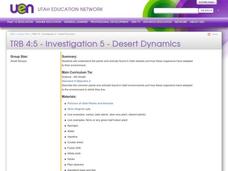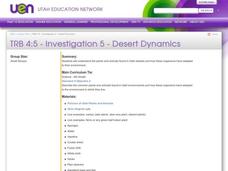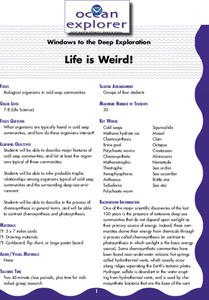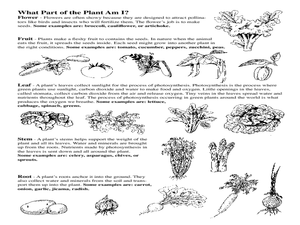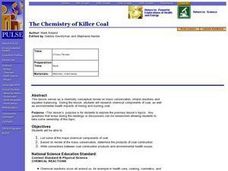Perkins School for the Blind
Building an Organic Molecule
Glucose is a simple sugar and a molecule that can be illustrated through modeling. Scientific investigators with visual impairments use hands-on models to reconstruct the process of bonding molecules. The tools used in this activity are...
Curated OER
What is Air?
Students investigate air by participating in a class experiment. In this matter measurement lesson, students identify air as a gas which consists of mass. Students utilize a windsock or balloon to measure oxygen and explore it's true...
Curated OER
Dissolved Oxygen Lesson
Students investigate what dissolved oxygen is and why it is important to aquatic life and what factors influence levels of dissolved oxygen in a lake. They study how to use MS Excel to make charts to show trends and correlations.
Curated OER
Water Quality and Temperature
Students are led through three activities to explore the effect of temperature fluctuations on the growth and survival of aquatic plants, clams, and shrimp eggs.
Curated OER
Desert Dynamics
Fourth graders examine the various types of plants and animals found in the deserts of Utah. In groups, they discover how the plants and animals have adapted to the harsh environment. To end the lesson plan, they compare and contrast...
Curated OER
Desert Dynamics
Students investigate the plants and animals found in Utah deserts and how these organisms have adapted to their environment. They brainstorm ways that desert plants are different from or similar to wetland plants.
Curated OER
Primary Producers
Students examine the role of carbon in the oceans and how phytoplankton determine the levels present. In groups, they practice measuring primary productivity using two methods. They use the internet to research the role of phytoplankton...
Curated OER
Carbon and Oxygen Cycles
Students construct their own diagrams outlining the pathway of carbon and oxygen in the atmosphere. Students explain their diagrams outlining the pathway and teacher checks for accuracy and completion.
Curated OER
Life is Weird!
Young scholars describe major features of cold seep communities, and list at least five organisms typical of these communities. They infer probable trophic relationships among organisms typical of cold-seep communities and the...
Curated OER
Bacteria Change Earth's Atmosphere
Tenth graders organize information to explain how photosynthetic bacteria contributed to climatic changes that happened on Earth. Students create a timeline by using a storyboard to tell the story of the change.
Curated OER
Teaching about the Chemistry of Oxygen Solubility
Students explore solubility of gases in water, Henry's Law, LeChatelier's Principal, and supersaturation of gases in water.
Curated OER
Ecology: Trees
Fourth graders research and identify the different layers of the forest. As a class, they observe real-life trees or analyze a poster, and discuss the characteristics of each forest layer. Students then draw a forest and label the...
Curated OER
Smog Be Gone
Students begin the instructional activity by identifying greenhouse gases. In groups, they observe and record the effect of the gases on the atmosphere and the temperature of the Earth. They participate in activities that describe the...
Curated OER
Photosynthetically Available Radiation (PAR) Measurements Part 1: Calculating the Solar Constant using a TI-8
Twelfth graders are introduced to the term Photosynthetically Available Radiation. In groups, they participate in an experiment to determine how ecosystems survive the conditions in the Arctic. They calculate the amount of solar energy...
Curated OER
The Biological Carbon Cycle
Young scholars learn about the biological carbon cycle. In this carbon cycle lesson, students access the web site and mouse over the diagrams to follow the carbon cycle. They read about what happens to humans and plants during this cycle.
Curated OER
Plant Party
Students identify plant parts. In this plants lesson, students bring in a vegetable. Each student classifies which part of the plant their vegetable comes from (flower, root, ect.) Students identify the parts of their vegetable and later...
Curated OER
Making Community Measurements: Which Plant Part?
Learners identify a plant in a given community and make a variety of measurements. They determine how a plant meets its basic needs. In addition to identifying plant parts, they observe seasonal change and compare plants within a community.
Curated OER
Plant Life
Seventh graders examine different categories of plant life and their roles as producers of food and oxygen for other organisms. They study the evolution of plants from simple organisms to very complex ones. They look at the different...
Curated OER
The Chemistry of Coal
Students investigate the chemistry of coal. This lesson serves as a review of conservation of mass, simple reactions and equation balancing. During the lesson, students research chemical components of coal, as well as environmental...
Curated OER
The Chemistry of Killer Coal
Students research chemical components of coal, as well as environmental health impacts of mining and burning coal. They discuss conservation of mass as it relates to combustion of organic compounds.
Curated OER
Plant Growth and Environment
Third graders bring to school various green plants and categorize them into plant leaves, stems, roots, and fruits. They answer the question, "How can you show there is starch in a plant?" and perform the iodine test and describe the...
Curated OER
Sea Ice Research
Students study sea ice and its importance in climate and climate change. They discuss sea ice as a presence of a food source for marine animals in the arctic and complete a lab activity. After completing the lab, they watch a video...
Curated OER
Dinoflagallates of Bioluminescent Bay
Fifth graders research dinoflagallates of the Bioluminescent Bay. They research the Internet for pictures of the Bio Bay and discuss the difference between ecosystems and ecoregions. They research a marine ecoregion and create a poster.







